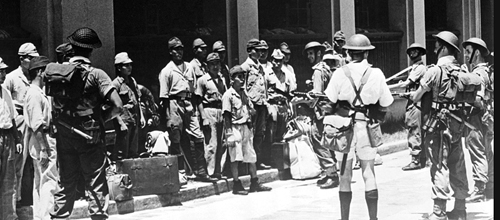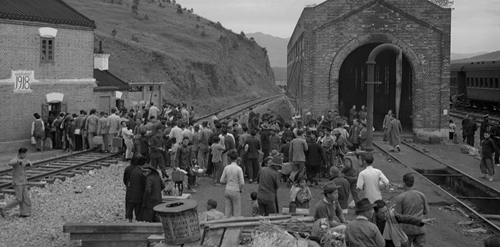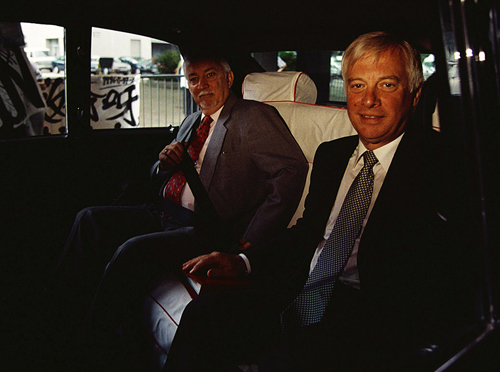4000 BC: Early Peoples For
many years, the popular version of history was that Hong Kong was a
“barren rock” devoid of people when the British arrived. In fact,
archaeology now shows that scattered primitive clans had settled by the
seaside on Hong Kong Island and the New Territories six millennia ago.
Their diet was not politically correct by today’s standards: bone
fragments show they liked to eat dolphin. AD 1127: Local Clans When
marauding Mongols drive the Song dynasty emperor’s family out of the
imperial capital of Kaifeng, one princess escapes to the walled village
of Kam Tin in the New Territories, where she marries into the powerful
Tang clan. 1841: The British Take Hong Kong Island In
a decisive move during the First Opium War between China and Britain,
Captain Charles Elliot of the British Royal Navy lands on Hong Kong
Island and plants the Union Jack on January 25. The 8,000-odd locals
seem to take it in their stride, but China and Britain continue to fight
over other Chinese trading cities. The 1842 Treaty of Nanking cedes
Hong Kong Island to Britain. 1860: Land Claim The
good times are rolling in Hong Kong, where the population has now
swelled to more than 86,000. The island is becoming cramped, however,
and after a series of further skirmishes between Britain and China, the
Kowloon Peninsula and Stonecutter’s Island are ceded to Britain. 1898: The 99-Year Lease Britain
digs in, turning Hong Kong into a mighty fort. Lyemun at the eastern
end of the island bristles with guns and the world’s first wire-guided
torpedo. Breathing space and water supplies are assured when on July 1,
the 99-year lease of the New Territories is signed in Peking. 1941: Japanese Occupation Hong
Kong has guns galore defending the sea, but the Japanese come by land.
They have little trouble breaching the aptly named Gin Drinkers Line – a
motley string of pillboxes. Hong Kong is surrendered two days before
Christmas, beginning a brutal three-year occupation.

Japanese soldiers captured by the British, 1945
1950: Economic Miracle The
territory’s economic miracle begins to unfold, as incoming refugees
from China provide an eager workforce, and British rule keeps things on
an even keel. Hong Kong’s transformation into a manufacturing centre
begins.

Chinese refugees at border,1950
1984: Handover Agreed The
Sino-British Joint Declaration is promulgated, after years of secret
talks between Margaret Thatcher and Deng Xiaoping. Deng coins the phrase
“one country, two systems” to quell fears. 1997: Handover Handover
night on 30 June is widely regarded as an anti-climax after years of
anticipation. The media focuses on soggy Union Jacks, last governor
Chris Patten’s tears, Prince Charles and his yacht, and Jiang Zemin’s
triumphant toast. The following dawn sees armoured cars rolling across
the border.

Last governor, Chris Patten
1998: Financial Crisis Asia’s
economic “tigers” are humbled as years of living on borrowed money
finally take their toll. Hong Kong is not as badly hit as some
countries, but the financial crisis bites nonetheless.
Top 10 Movers and Shakers
Jorge Alvares In 1513 the Portuguese navigator Alvares becomes the first European to visit Hong Kong. Cheung Po-tsai The Lantau-based pirate king Cheung Po-Tsai wreaks havoc with international traders in 1810. Lin Zexu Commissioner Lin Zexu is appointed by China in 1839, with the task of ending the trade in imported opium. Captain Charles Elliot Flag-planter Captain Charles Elliot claims Hong Kong Island for Britain in 1841. Sir Henry Pottinger Pottinger becomes Hong Kong’s first governor. He turns a blind eye to illicit shipments of opium. Dr Sun Yat-sen The
reformer blasts China as “chaotic and corrupt” during a lecture at Hong
Kong University in 1923. Economic boycott of the colony follows. Rensuke Isogai In 1941 the military commander begins his barbaric reign as Japan’s wartime governor of Hong Kong. Deng Xiaoping The Chinese premier sticks to his principles during Handover talks in 1984. Chris Patten Lachrymose last governor Chris Patten waves goodbye to Hong Kong in 1997. Tung Chee-hwa The shipping magnate Tung Chee-hwa takes Hong Kong’s helm after Handover.
|